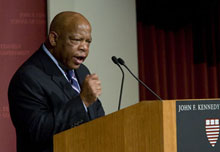
November 20, 2008 — The 2008 Theodore H. White Lecture on Press and Politics took place on a cold evening, but the atmosphere inside the forum of the John F. Kennedy School of Government was radiant. After a welcome by Dean David Ellwood, Shorenstein Center director Alex S. Jones introduced the winner of the 2008 David Nyhan Prize for Political Journalism, New York Times op-ed columnist Bob Herbert, and then the T.H. White Lecturer himself, Rep. John Lewis.
- Watch the Video
- Read the Transcript
The event took place just 16 days after the election of Barack Obama to the presidency, and the emotions Lewis felt were still strong. He referred to his lecture as a “testimony,” and took those present on a walk through the Deep South in the days of segregation. He described his youth as the son of sharecroppers, his political awakening listening to the words of Martin Luther King Jr., the peaceful 1965 march he and hundreds of others attempted to make from Selma to Montgomery that ended in violence. He recalled so many who didn’t live to see Obama’s election, and evoked their names, one after another. Obama’s election was the product of a “peaceful revolution,” Lewis said, and called on all those present to continue that work.
The following morning, Lewis participated in the Theodore H. White Seminar. Other panelists included Lawrence Bobo, W.E.B. Dubois Professor of the Social Sciences, Harvard University; Alex Castellanos, political media consultant and Fellow at the Institute of Politics; Maralee Schwartz, Visiting Murrow Lecturer in the Practice of Press and Public Policy, Shorenstein Center, and former political editor at the Washington Post; and Cynthia Tucker, editorial page editor and syndicated columnist, Atlanta Journal-Constitution. The discussion was moderated by Alex S. Jones.
Jones asked the panelists to continue with the theme of the nonviolent revolution that Lewis had invoked the night before. After each one tackled the question, Lewis suggested that the election signified that America was ready to “lay down the burden of race,” even if it wouldn’t signal the end of racism. His priorities as a congressman working with Obama were simple: End the war in Iraq and make health care available to all, he said, calling the fact that 50 million Americans don’t have insurance “a blight on our society.”

